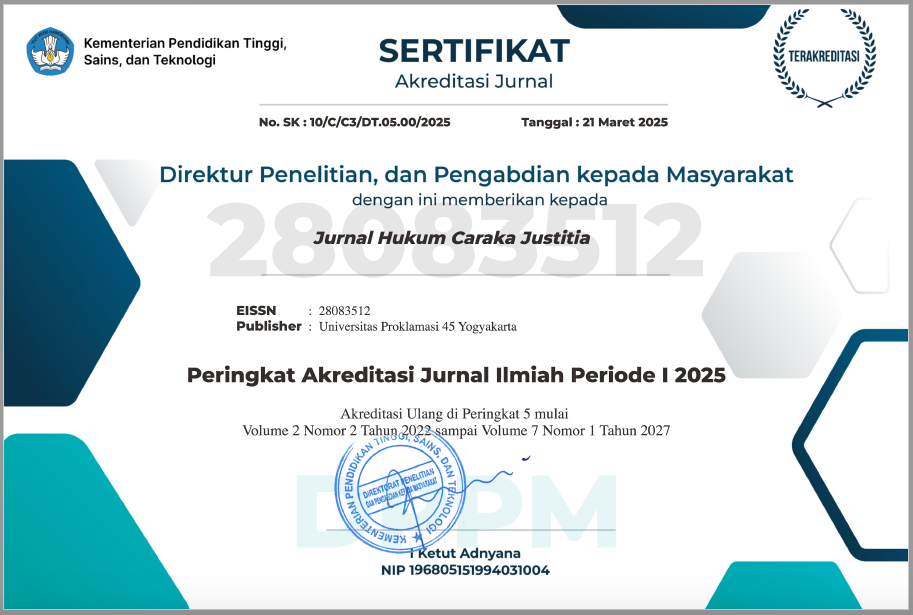Penerapan Restorative Justice Kepolisian Terhadap Pencemaran Nama Baik dalam Dunia Digital
DOI:
https://doi.org/10.30588/jhcj.v2i2.1100Keywords:
Restorative Justice, Criminal, Defamation, Good Name (Dignity), Digital.Abstract
The National Police of the Republic of Indonesia is given a very broad authority in carrying out its duties as the main task of the National Police, among others Harkamtibmas, Protecting, Mengayami, Serving the community and Law Enforcement, in which it is also given another authority that is discretionary police an authority to perform actions based on the conscience of police members on duty and supported by the rules that exist in police institutions. The issue that will be discussed is whether the concept of Restorative Justice in accordance with the Circular letter of the Police Chief Number SE/2/II/2021 on Ethical Cultural Awareness to Realize a Clean Digital Space of Indonesia, Healthy, and Productive can be applied in accordance with the Law of the Republic of Indonesia No. 19 of 2016 Amendments to Law No. 11 of 2008 on Information and Electronic Transactions and Criminal Defamation regulated in the Criminal Code as an alternative to suppress cybercrime, but also must be able to as a deterrent effect in order to provide protection for the human rights of others.
References
Artikel Jurnal
Anggraeni, Rita, & Rd. Henda. “Penegakan Hukum Pelaku Perusakan Fasilitas Umum Di Kota Cirebon Dikaitkan Dengan Perda Nomor 9 Tahun 2003 Tentang Ketertiban Umum”. Jurnal Hukum Responsif 11, no. 1 (Februari 2020): 24-34. https://pdfs.semanticscholar.org/2638/2aab3838d2c7921adb7d93940ec8efe68346.pdf.
Bawono, Bambang Tri. ”Reformation Of Law Enforcement Of Cyber Crime In Indonesia.” Jurnal Pembaharuan Hukum Pidana 6, no. 3 (September – Desember 2019): 332-349. https://jurnal.unissula.ac.id/index.php/PH/article/download/332-349/4121.
Hartanto & Aida Dewi. “Posisi Hukum Korban Perzinahan Yang Dilaporkan Atas Tindak Pidana Kesusilaan Berdasar Undang-Undang Nomor 19 Tahun 2016 Tentang Informasi Dan Transaksi Elektronik.” Jurnal Hukum: To-Ra 6, no. 3 (Desember 2020): 199-207. http://ejournal.uki.ac.id/index.php/tora/article/download/2635/1716.
Hartanto & Aris Sudarmono. “Omnibus Law Between Justice And Benefits (Omnibus Law Opportunities And Challenges Towards Entrepreneurs And Labor : Comparative Review Law).” The 1st Proceeding, The 6th Proceeding International Conference And Call Paper, Universitas Islam Sultan Agung.
Hasibuan, lr. “Restorative Justice Sebagai Pembaharuan Sistem Peradilan Pidana Berdasarkan UU Nomor 11 Tahun 2012 Tentang Sistem Peradilan Pidana Anak”. USU Law Journal 3, no. 3 (November 2015): 64-71.
Hendrik, Anton, & Januar Simorangkir. “Kebebasan Informasi di Dunia Siber dan Pembajakan Musik, Video dan Software.” Jurnal The Arysuta Center Series on Strategic Management 26, 2014.
Istiqamah. “DT. Analisis Keadilan Restoratif Pada Penerapan Hukum Adat di Indonesia”. Jurnal Veritas et Justitia 4, no. 1 (Juni 2018): 206-226. https://journal.unpar.ac.id/index.php/veritas/article/download/2914/2512.
Natsif, Fadli Andi. “Perlindungan Hak Asasi Manusia Dalam Perspektif Negara Hukum Indonesia.” Al-Risalah 19, no. 1 (Mei 2019): 148-158.
See, Benedictus Renny. “Perlindungan Hukum Bagi Nasabah Dan Bank Terhadap Tindak Kejahatan Berbasis Teknologi Informasi (Cyber Crime).” Jurnal Hukum Caraka Justitia 2, no. 1 (Mei 2022): 54-74, https://ejournal.up45.ac.id/index.php /JHCJ/article/download/1035/739.
Buku
Asshiddiqie, Jimly. Konstitusi & Konstitusionalisme Indonesia. Jakarta: Konstitusi Press, 2005.
Barton, Charles K. B. Restorative Justice (The Empowerment Model). Sydney: Hawkins Press, 2003.
Braithwaite, John. Restorative Justice and Responsive Regulation. New York: Oxford University Press, 2002.
Chazawi, Adami, & Ardi Ferdian. Tindak Pidana Informasi dan Transaksi Elektronik. Malang: Bayu Media Publishing, 2010.
Fuady, Munir. Teori-Teori Besar (Grand Theory) dalam Hukum. Jakarta: Prenadamedia Grup, 2013.
Gasita, Arif. Masalah Korban Kejahalan. Jakarta: CY Akademika Pressindo, 1993.
Hadi, Supemo. Kriminalisasi Anak. Jakarta: PT Gramedia Pustaka Utama, 2010.
Hiariej, Eddy O.S. Prinsip-prinsip Hukum Pidana. Yogyakarta: Cahaya Atma Pustaka, 2016.
Lamintang, P.A.F., & Djisman S. Hukum Pidana Indonesia. Bandung: Sinar Baru, 1990.
Soekanto, Soerjono, & Sri Mamudji. Penelitian Hukum Normatif Suatu Tinjauan Singkat. Jakarta: Rajawali Pers, 1995.
Artikel Internet
Anggraini, Pingkan. "Kronologi Versi Roy Suryo Soal Kisruh Dituding Tabrak Lari Lucky Alamsyah". https://hot.detik.com/celeb/d-5581137/kronologi-versi-roy-suryo-soal-kisruh-dituding-tabrak-lari-lucky-alamsyah (diakses 17 Mei 2022).
Arifiyadi, Teguh. "Azril Sopandi dan Gagal Paham Penerapan Pasal 27 Ayat 3 UU ITE". https://news.detik.com/kolom/d-3460246/azril-sopandi-dan-gagal-paham-penerapan-pasal-27-ayat-3-uu-ite (diakses 12 Mei 2022).
Kompas.com. "Kabareskrim: Kasus Guru Laporkan Siswa dengan UU ITE di NTT Berakhir Damai". https://nasional.kompas.com/read/2021/03/02/14214641/kabareskrim-kasus-guru-laporkan-siswa-dengan-uu-ite-di-ntt-berakhir-damai (diakses 11 Mei 2022).
Lokadata.id. “Kapolri keluarkan surat edaran penanganan kasus UU ITE”. https://lokadata.id/artikel/kapolri-keluarkan-surat-edaran-penanganan-kasus-uu-ite (diakses 12 Juni 2022).
Oktaviani, Murni. “Mengenal Konsep Restorative Justice”. https://ilmu.lpkn.id/2021/03/01/mengenal-konsep-restorative-justice/ (diakses 12 April 2022).
Presisi.net. “1.864 Kasus Diselesaikan dengan Restorative Justice”. https://presisi.net/2021/05/17/1-864-kasus-diselesaikan-dengan-restorative-justice/ (diakses 13 Mei 2022).
Peraturan Perundang-Undangan
Universal Declaration of Human Rights (UDHR) Tahun 1948 di butir 8 mengenai Perlakuan adil oleh pengadilan yang adil.
UU Republik Indonesia Nomor 11 Tahun 2008 tentang Informasi Dan Transaksi Elektronik.
UU Republik Indonesia Nomor 19 Tahun 2016 tentang Perubahan Atas Undang-Undang Nomor 11 Tahun 2008 Tentang Informasi Dan Transaksi Elektronik.
Putusan Mahkamah Agung Nomor 1600 K/PID/2009 tentang Perdamaian dalam Kasus Pidana Nilainya Lebih Tinggi.
Surat Edaran Kapolri Nomor 7 tahun 2018 (SE/8/VII/2018 tanggal 27 Juli 2018) tentang Penerapan Keadilan Restoratif (Restorative Justice).
Surat Edaran Kapolri Jenderal Listyo Sigit Prabowo Nomor SE/2/11/2021 tentang Kesadaran Budaya Beretika untuk Mewujudkan Ruang Digital Indonesia yang Bersih, Sehat, dan Produktif.
SK Dirjen Badilum Nomor 1691/DJU/SK/PS.00/12/2020 tentang Pemberlakuan Pedoman Penerapan Keadilan Restoratif (Restorative Justice).
Surat Telegram Kabareskrim Nomor STR/583/VIII/2012 tanggal 08 Agustus 2012 tentang Penerapan Restorative Justice.
Downloads
Published
How to Cite
Issue
Section
License
Copyright (c) 2022 hartanto hartanto

This work is licensed under a Creative Commons Attribution 4.0 International License.
Authors who publish with JHCJ agree to the following terms:
Authors retain copyright and grant the JHCJ right of first publication with the work simultaneously licensed under a Creative Commons Attribution 4.0 International License that allows others to share (copy and redistribute the material in any medium or format) and adapt (remix, transform, and build upon the material) the work for any purpose, even commercially with an acknowledgment of the work's authorship and initial publication in JHCJ.
Authors are able to enter into separate, additional contractual arrangements for the non-exclusive distribution of the journal's published version of the work (e.g., post it to an institutional repository or publish it in a book), with an acknowledgment of its initial publication in JHCJ. Authors are permitted and encouraged to post their work online (e.g., in institutional repositories or on their website) prior to and during the submission process, as it can lead to productive exchanges, as well as earlier and greater citation of published work (See The Effect of Open Access).














